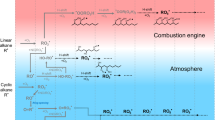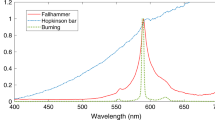Abstract
The removal of metallic mirrors is a well-established technique for the detection and identification of free radicals produced in the decomposition of organic compounds. The rate of removal of mirror is usually followed by photometric means, in which the opacity of the mirror is matched against that of a standard. In the course of an investigation into the attack of free radicals on coal and coal by-products at high temperatures, it was found that the evolution of smoke and tarry material tended to make the use of optical methods somewhat unreliable. It was thought that measurement of the electrical conductivity of mirrors could be applied to the problem and, in particular, glass elements of the type used in the measurement of the dewpoint of combustion gases containing sulphur oxides1 seemed to be ideal for this purpose.
This is a preview of subscription content, access via your institution
Access options
Subscribe to this journal
Receive 51 print issues and online access
$199.00 per year
only $3.90 per issue
Buy this article
- Purchase on Springer Link
- Instant access to full article PDF
Prices may be subject to local taxes which are calculated during checkout
Similar content being viewed by others
References
Dooley, A., and Whittingham, G., Trans. Farad. Soc., 42, 354 (1946).
Author information
Authors and Affiliations
Rights and permissions
About this article
Cite this article
WHITTINGHAM, G. A New Technique for Following the Attack of Metallic Mirrors by Free Radicals. Nature 160, 671–672 (1947). https://doi.org/10.1038/160671a0
Issue Date:
DOI: https://doi.org/10.1038/160671a0
Comments
By submitting a comment you agree to abide by our Terms and Community Guidelines. If you find something abusive or that does not comply with our terms or guidelines please flag it as inappropriate.



